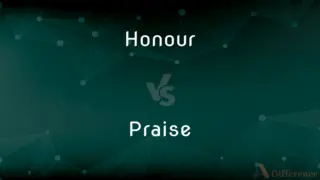Electro vs. Techno — What's the Difference?
By Maham Liaqat & Urooj Arif — Updated on April 15, 2024
Electro focuses on robotic sounds and heavy use of drum machines and vocoders, while techno emphasizes repetitive rhythms and is generally more minimalistic.

Difference Between Electro and Techno
Table of Contents
ADVERTISEMENT
Key Differences
Electro is characterized by its funky, robotic soundscapes, often incorporating elements like vocoders and synthesizers that provide a futuristic feel. Whereas, techno tends to employ a more stripped-down aesthetic, focusing on repetitive beats and a hypnotic flow that encourages continuous dance.
In electro, the beats per minute (BPM) can vary, but it typically stays within a range that supports breakdancing—one of the cultures closely associated with the genre. On the other hand, techno music usually features a faster tempo, which is designed to maintain energy on the dance floor over extended periods.
The origins of electro can be traced back to the early 1980s, emerging from the fusion of funk and New York hip-hop with electronic music. Whereas techno originated in Detroit in the mid-1980s as a form of electronic dance music that drew heavily from Chicago house and the European electronic scene.
Electro often makes extensive use of sampling and real instrument sounds, modified to enhance the electronic vibe. On the other hand, techno is more focused on synthesized sounds, using advanced software and hardware synthesizers to create its distinctive layers.
The audience for electro is often those who appreciate the breakdancing and hip-hop culture, highlighting a street-style performance aspect. Whereas, techno appeals to ravers and club-goers, emphasizing the immersive experience of sound and light in a communal dance setting.
ADVERTISEMENT
Comparison Chart
BPM
Variable, often lower
Generally faster
Sound
Robotic, heavy use of vocoders
Minimalistic, repetitive
Origins
Early 1980s, USA
Mid-1980s, Detroit
Focus
Breakdancing, street culture
Rave culture, club scene
Instruments
Drum machines, real instrument sounds
Advanced synthesizers, software
Compare with Definitions
Electro
A genre of electronic music emphasizing drum machines and futuristic sounds.
Electro tracks often feature robotic vocals processed through a vocoder.
Techno
Associated with rave and underground club culture.
Techno is a staple in nightclubs around the world, especially in Europe.
Electro
Music characterized by its rhythm suitable for breakdancing.
Electro beats are popular in breakdance battles for their energetic feel.
Techno
Largely instrumental with occasional minimal vocals.
Techno music focuses more on beats and less on lyrics.
Electro
A style that incorporates hip-hop and funk elements.
Electro often samples old funk hits to enrich its sound texture.
Techno
A form of electronic dance music known for its repetitive beats.
Techno tracks maintain a steady rhythm that keeps dancers moving.
Electro
Known for its experimental approach to electronic sound.
Electro artists frequently experiment with new synthesizer settings.
Techno
Characterized by a continuous DJ set blending multiple tracks.
Techno DJs often weave tracks into a seamless flow for hours.
Electro
Focuses on a thematic expression of urban street culture.
Electro music videos often feature urban settings and street dance performances.
Techno
Originated from Detroit, influencing global electronic scenes.
Techno from Detroit is revered for its raw and powerful sound.
Electro
(archaic) To electrotype.
Techno
Any of various styles of dance music characterized by electronic sounds and a high-energy, rhythmic beat.
Electro
An electrotype.
Techno
(music genre) A repetitive style of music originally produced for use in a continuous DJ set. The central rhythmic component is most often in common time (4/4), where time is marked with a bass drum on each quarter note pulse, a backbeat played by snare or clap on the second and fourth pulses of the bar, and an open hi-hat sounding every second eighth note.
Electro
An electronic style of hip hop; electrofunk.
Techno
Techno is a genre of electronic dance music (EDM) that is predominantly characterized by a repetitive four on the floor beat which is generally produced for use in a continuous DJ set. The central rhythm is often in common time (4/4), while the tempo typically varies between 120 and 150 beats per minute (bpm).
Electro
An electrotype.
Techno
A form of music primarily created by computer sound synthizers rather than by musicians playing instruments.
Common Curiosities
How does techno differ from other electronic music genres?
Techno is more minimalistic and focuses on repetitive structures and rhythms.
What instruments are typical in electro music?
Electro typically uses vocoders, drum machines, and modified real instruments.
How does techno music maintain its energy?
Techno uses repetitive, fast-paced rhythms to create a hypnotic and energetic dance experience.
What is the historical origin of electro?
Electro originated in the early 1980s, combining elements of hip-hop and electronic music.
What tempo is common in techno music?
Techno generally features a faster tempo to sustain dance energy.
What settings are associated with techno music?
Techno is often heard in clubs and raves, designed for extended DJ sets.
How do artists in electro express themselves?
Electro artists often express themselves through thematic content related to urban culture.
What defines the sound of electro music?
Electro is defined by its use of drum machines and a futuristic, robotic sound.
Who are the typical audiences for electro music?
Electro appeals to fans of breakdancing and urban street culture.
What role do DJs play in techno music?
DJs in techno are central, creating seamless transitions between tracks to maintain dance flow.
How did techno evolve from its Detroit roots?
Techno evolved by incorporating influences from Chicago house and European electronic music.
Can electro music be considered a form of techno?
While both are electronic music genres, electro has distinct hip-hop and funk influences.
What is the global impact of techno music?
Techno has significantly influenced electronic music scenes worldwide, especially in club and rave cultures.
How is sampling used differently in electro and techno?
Electro uses sampling to incorporate funk and hip-hop elements, while techno focuses on synthetic sounds.
What cultural movements are associated with techno?
Techno is closely linked to rave culture and modern electronic dance movements.
Share Your Discovery

Previous Comparison
Honour vs. Praise
Next Comparison
Valid vs. ValidatedAuthor Spotlight
Written by
Maham LiaqatCo-written by
Urooj ArifUrooj is a skilled content writer at Ask Difference, known for her exceptional ability to simplify complex topics into engaging and informative content. With a passion for research and a flair for clear, concise writing, she consistently delivers articles that resonate with our diverse audience.












































